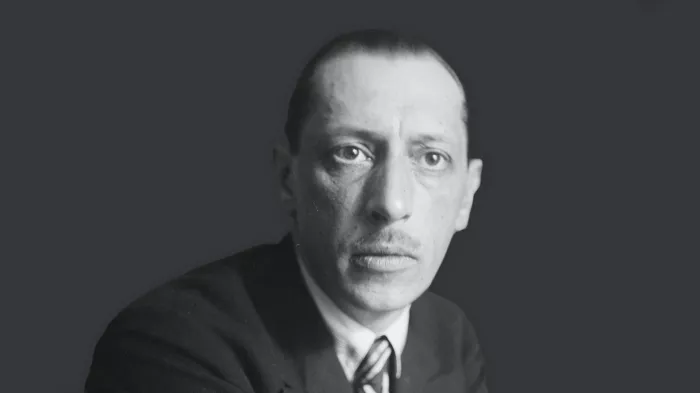The 20th century was a time of great change and innovation in classical music. Composers broke away from traditional forms and experimented with new techniques, sounds, and structures. This era produced a diverse range of music that reflected the tumultuous times and the rapid technological advancements. Below, we explore some of the most influential 20th-century classical composers and their contributions to music.
Top 10 of 20th Classical Composers: A Full Guide
1. Igor Stravinsky
Igor Stravinsky (1882-1971) was a Russian composer who revolutionized classical music with his innovative works. His early ballet compositions, such as The Firebird (1910), Petrushka (1911), and The Rite of Spring (1913), broke new ground in rhythm, harmony, and orchestration. The Rite of Spring, in particular, caused a scandal at its premiere due to its dissonant music and provocative choreography. Stravinsky’s ability to adapt and innovate over his long career, embracing neoclassicism and serialism, cemented his status as one of the greatest composers of the 20th century.
2. Arnold Schoenberg
Arnold Schoenberg (1874-1951) was an Austrian composer and music theorist known for developing the twelve-tone technique. This method, also called serialism, involves using all twelve notes of the chromatic scale in a specific order, ensuring that no single note dominates the composition. Schoenberg’s pioneering work in atonality, exemplified in pieces like Pierrot Lunaire (1912), challenged the conventions of harmony and melody, influencing countless composers and changing the course of modern music.
3. Béla Bartók
Béla Bartók (1881-1945) was a Hungarian composer and ethnomusicologist who incorporated folk music elements into his compositions. Bartók collected and studied traditional music from Eastern Europe, integrating these influences into works such as his Concerto for Orchestra (1943) and Music for Strings, Percussion, and Celesta (1936). His rhythmic complexity, use of modal scales, and innovative approach to form and structure made him a pivotal figure in 20th-century music.
4. Dmitri Shostakovich
Dmitri Shostakovich (1906-1975) was a Soviet composer whose music often reflected the political climate of his time. His works, such as his Symphony No. 5 (1937) and String Quartet No. 8 (1960), are characterized by their emotional intensity, irony, and masterful orchestration. Despite facing censorship and political pressure, Shostakovich managed to create a body of work that is both deeply personal and universally resonant.
5. Olivier Messiaen
Olivier Messiaen (1908-1992) was a French composer and organist known for his unique musical language. He drew inspiration from religious themes, bird songs, and non-Western music. His works, such as the Quartet for the End of Time (1941) and the Turangalîla-Symphonie (1948), are noted for their complex rhythms, rich harmonies, and vivid colors. Messiaen’s influence extended to many contemporary composers, particularly through his teachings at the Paris Conservatoire.
6. Aaron Copland
Aaron Copland (1900-1990) was an American composer who sought to create a distinctively American style of classical music. He achieved this through the use of folk tunes, open harmonies, and clear textures. Works like Appalachian Spring
(1944), Rodeo (1942), and Fanfare for the Common Man (1942) embody the spirit of American optimism and simplicity. Copland’s accessible yet sophisticated music has made him one of the most beloved composers of the 20th century.
7. Benjamin Britten
Benjamin Britten (1913-1976) was an English composer, conductor, and pianist whose operas and vocal music are highly regarded. His works, such as Peter Grimes (1945), War Requiem (1962), and The Young Person’s Guide to the Orchestra (1945), showcase his gift for melody, orchestration, and dramatic storytelling. Britten’s music often explores themes of pacifism, human suffering, and social justice, reflecting his deep concern for humanity.
8. John Cage
John Cage (1912-1992) was an American composer and theorist known for his avant-garde and experimental approach to music. He challenged traditional notions of music with works like 4’33” (1952), which consists of four minutes and thirty-three seconds of silence, highlighting the ambient sounds of the environment. Cage’s use of chance operations, prepared piano, and electronic music expanded the boundaries of what music could be and influenced generations of composers and artists.
9. György Ligeti
György Ligeti (1923-2006) was a Hungarian-Austrian composer whose music is known for its complexity and innovation. His works, such as Atmosphères (1961) and Lux Aeterna (1966), are characterized by dense textures and micro-polyphony, where multiple musical lines are interwoven in a complex web. Ligeti’s music gained wider recognition through its use in Stanley Kubrick’s film 2001: A Space Odyssey, and his influence can be seen in the works of many contemporary composers.
10. Leonard Bernstein
Leonard Bernstein (1918-1990) was an American composer, conductor, and educator who made significant contributions to both classical and popular music. His Broadway musicals, such as West Side Story (1957), and his symphonic works, like the Chichester Psalms (1965), demonstrate his ability to blend different musical styles and traditions. Bernstein’s dynamic conducting style and charismatic personality also made him a beloved figure in the world of classical music.
See Also: Valuing Soviet Era Classical Music on Vinyl
Conclusion
The 20th century was a period of immense creativity and transformation in classical music. These composers, through their innovative techniques and unique voices, pushed the boundaries of music and left a lasting legacy that continues to inspire and influence musicians and listeners today. Their works reflect the diversity, complexity, and beauty of the human experience, making them timeless contributions to the world of music.

